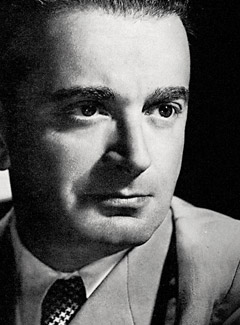BARTÓK AND RÓZSA
Notes on the composers and the pieces
Béla Bartók
Concerto for Orchestra
Return to Home Page |

Miklós Rózsa:
Overture to a Symphony Concert, Op. 26a (1963)
Notturno ungherese (Hungarian Nocturne), Op. 28 (1964)
Three Hungarian Sketches, Op. 14 (1938)
Miklós Rózsa was born in 1907 in Budapest, Hungary. His father was a well-to-do industrialist, his mother, a pianist who gave her son his first piano lessons. He began violin lessons at five, and later took up the viola. As a youth, he spent several happy summers in a village near the Mátra Mountains, surrounded by the folk music that would be at the heart of the music he composed all his life. After high school, he enrolled at the Leipzig Conservatory, studied composition with Hermann Grabner, and earned a publishing contract after a performance of his Piano Quintet. Upon graduation, he taught at the conservatory for two years before moving to Paris in 1931 at the suggestion of Marcel Dupré. A number of successful works followed: Hungarian Serenade, admired by Richard Strauss; Theme, Variations, and Finale; Three Hungarian Sketches; and chamber pieces. While in Paris, he befriended Arthur Honegger, who advised him that composing music for films was a sound way for a composer to make a living. After seeing the movie Les Misérables, scored by Honegger, Rózsa would soon take his friend’s advice.
As much as Rózsa loved Paris, it was a difficult place for a young composer, so he moved on to London in 1935. Soon after arriving, he earned a commission for a ballet, Hungaria. Film director Jacques Feyder was so impressed by the music that he convinced film producer Alexander Korda to hire the young man to score Knight without Armour. Rózsa went on to score several films for Korda. His breakthrough was The Four Feathers, but The Thief of Baghdad changed his life. Production delays caused by the outbreak of World War II forced Korda to finish Thief in Hollywood. Rózsa went along for a temporary stay that turned into permanent residency and American citizenship.
Rózsa’s early work in Hollywood included Five Graves to Cairo, Double Indemnity, The Lost Weekend, Spellbound, and The Killers. In 1948, he joined MGM where he scored Madame Bovary, The Asphalt Jungle, Ivanhoe, Julius Caesar, Knights of the Round Table, Lust for Life, Ben-Hur, King Of Kings, and Quo Vadis. Work on this last film in 1951 sent him to Italy, where he would thereon return summers to compose classical works. After leaving MGM in 1962, he scored El Cid (which he considered his last great score), The Private Life of Sherlock Holmes, Providence, and Time after Time. After Dead Men Don’t Wear Plaid in 1981, a stroke ended his fast-paced film career, but he continued to compose classical works. He also wrote his autobiography, A Double Life, the title referring to his work as a film and classical composer.
Rózsa scored 95 films and received 13 Oscar nominations, winning for Spellbound (1945), A Double Life (1947), and Ben-Hur (1959). His insistence on quality and historical accuracy produced many breakthroughs in film music. Double Indemnity expanded Hollywood’s musical techniques, and his recording of Rudyard Kipling’s The Jungle Book was the first recording of a movie score in the United States. He was the last great composer of Hollywood’s “Golden Age,” but it was classical composing that he loved the most. Among his most prominent classical works in addition to those mentioned above, are Concerto for String Orchestra, The Vintner’s Daughter, Tripartita For Orchestra, concertos for violin, viola, cello, and piano, and an unpublished symphony.
Rózsa’s music combined the pentatonic and modal scales of Hungarian folk music with standard Western techniques, anchored by rich, often brooding melody (but never atonality). His classical works were popular in his active years, but they lacked some of the staying power and influence of his film scores, which seem more filled out and expressive, as if film’s time strictures and visual stimulation brought out the best in him. He died on July 27, 1995.
Three Hungarian Sketches (1938, rev. 1958). “Capriccio” is dancelike, lighthearted, and sprightly, with mixed meter and off-rhythm accents. “Pastorale” is a nocturne based on a modal melody that begins in the violas, streams through the winds and strings, is countered by a livelier theme, and returns for a short climax. “Danza” is an largely athletic treatment of three dance themes offset by several moody and introverted passages.
Overture to a Symphony Concert (1956, rev. 1963) was written at the request of Ernst Eulenburg, who published Rózsa’s early work. He at first planned to commemorate the Hungarian Revolution, but decided instead on this overture whose martial character swings between bold passages reminiscent of his “Roman” scores and the restlessness of his noir films. The overture is dedicated to Eugene Zador, a fellow Hungarian expatriate and composer who was Rózsa’s orchestrator during his MGM years.
The rapturous Notturno ungherese (Hungarian Nocturne) (1964), commissioned by a Mr. Benjamin for Eugene Ormandy’s Philadelphia Orchestra, draws on memories of Rózsa’s family estate in Hungary and is one of his most beautiful works.
—Roger Hecht
Roger Hecht plays trombone in the Mercury Orchestra, Lowell House Opera, and Bay Colony Brass (where he is the Operations/Personnel Manager). He is a former member of the Syracuse Symphony, Lake George Opera, New Bedford Symphony, and Cape Ann Symphony. He is a regular reviewer for American Record Guide, contributed to Classical Music: Listener’s Companion, and has written articles on music for the Elgar Society Journal and Positive Feedback magazine. His latest fiction collection, The Audition and Other Stories, includes a novella about a trombonist preparing for and taking a major orchestra audition (English Hill Press, 2013).
Read about Bartók
Return to Home Page
BUY TICKETS
|
